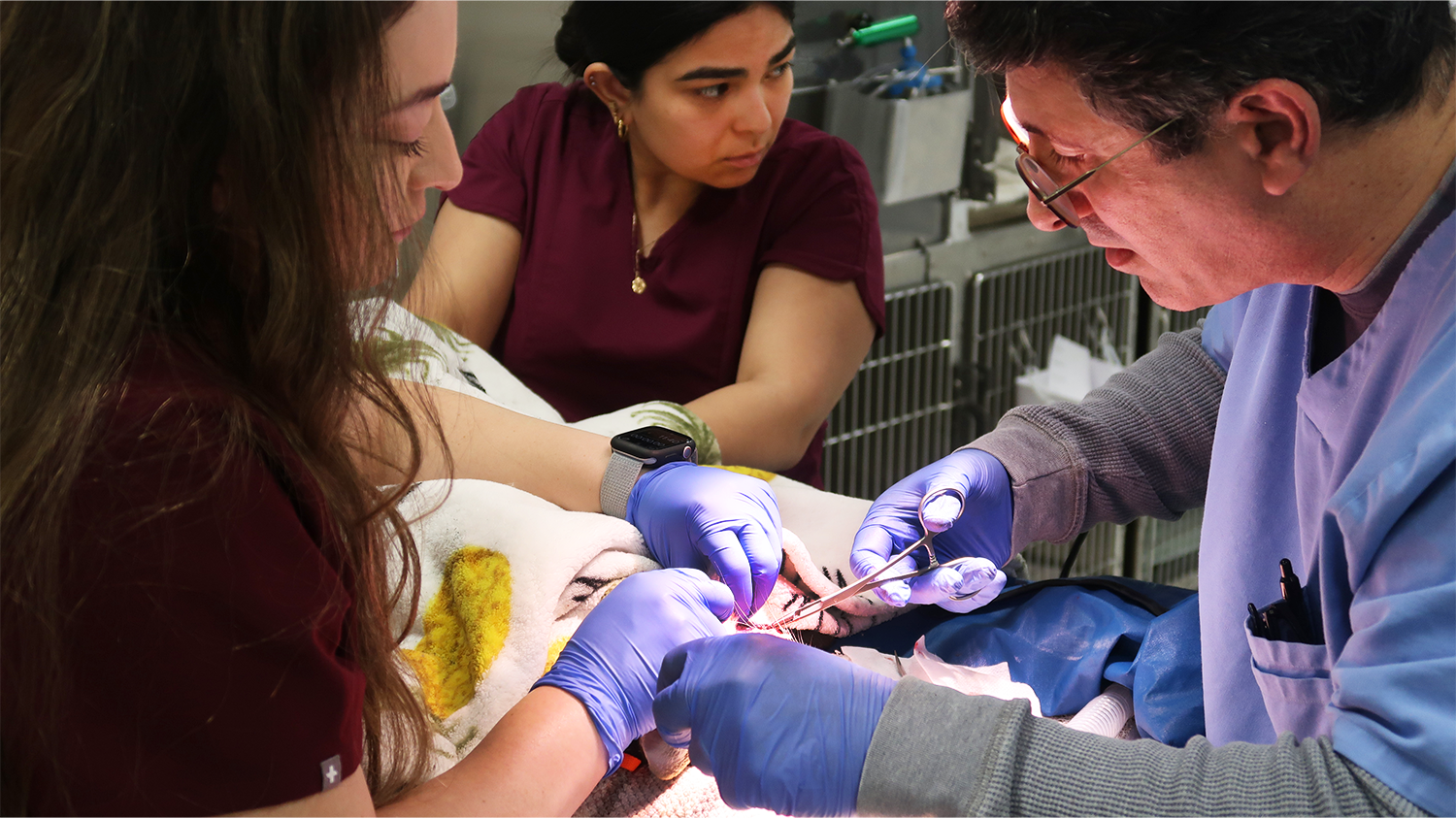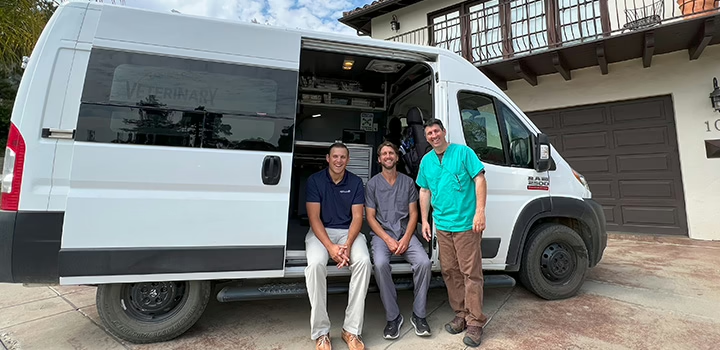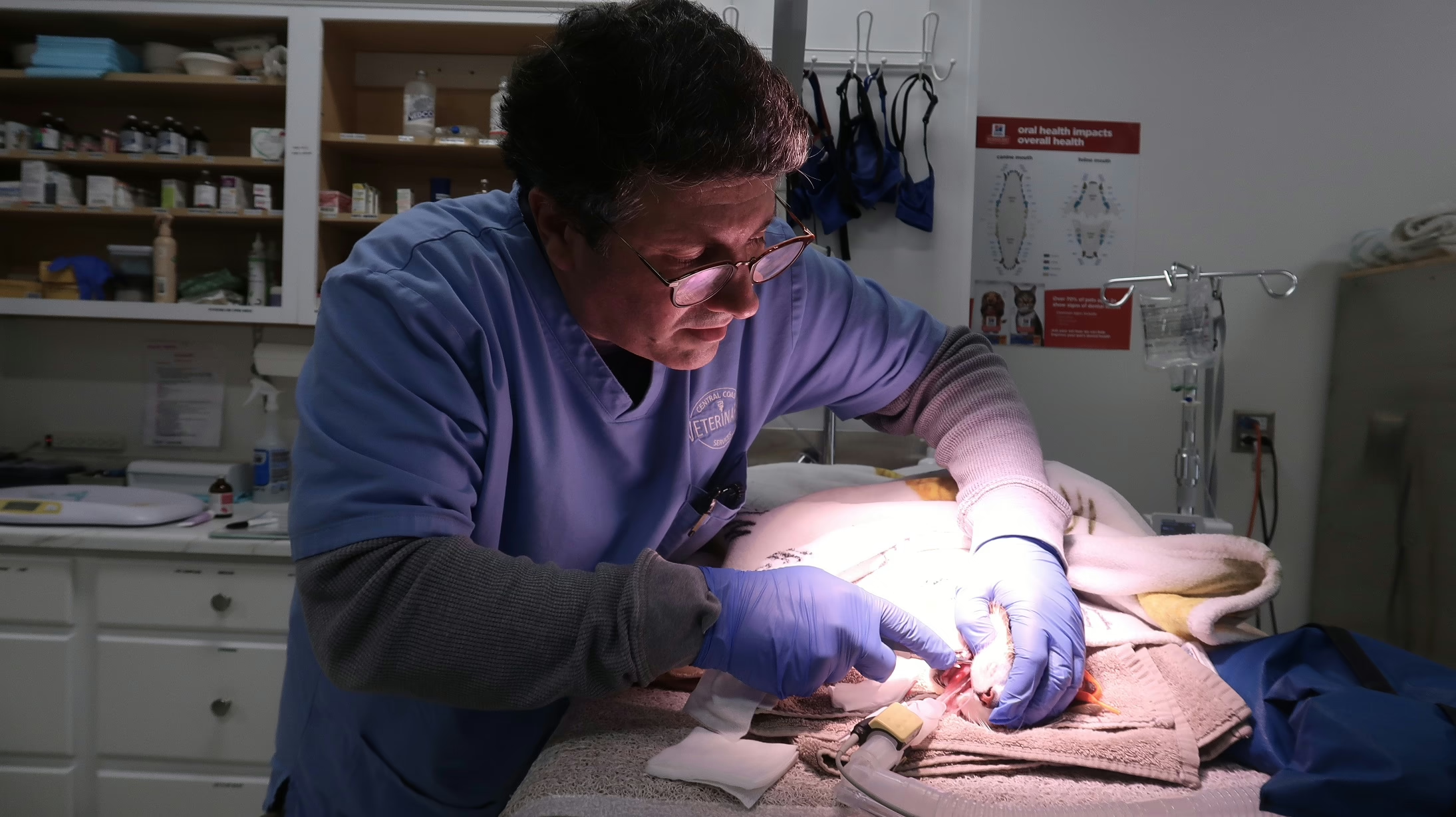Bringing Animal Care to Your Driveway: MBA Alum Helps Lead Mobile Vet Business

Raffy Dorian, veterinarian and co-owner of Vetama, performs surgery on a cat. Assisting are, left, Sasha Magana, a registered veterinary technician, and recent Cal Poly graduate Jeanette Hernandez, who is working with Vetama until she attends veterinary school. (Photo: Nick Forselles)
Inside the Vetama animal clinic, Dr. Raffy Dorian stands over the operating table, his gloved hands moving with steady intention, as he adjusts the instruments laid out beside a sedated tabby cat. The animal lies still, eyes open but unfocused under anesthesia. Dorian (Animal Science, ’92) works quietly, pausing only to gently reposition the cat’s head or smooth the edge of a towel beneath its body.
“My mindset, and I tell our staff this, is that when we go into any procedure that patient is the most important thing in the world to us for the next two hours,” Dorian said.
A few weeks earlier, the same cat had stopped eating, its mouth inflamed by a painful gum condition called stomatitis. Instead of being packed into a carrier and driven to a clinic, a white van bearing Vetama’s heart-and-paw logo pulled into the driveway, bringing the clinic to the cat.
Inside the van, stainless steel cabinets and fold-out work surfaces turned the space into a compact exam room. Dorian and his team examined the cat on site, obtained bloodwork, and scheduled surgery, all without the animal ever leaving the driveway.
This kind of accessibility is the foundation of Vetama, a San Luis Obispo-based startup founded in 2022 by a team that includes two Cal Poly alumni – Dorian and MBA grad Jacob Wright (Animal Science, ’20; MBA, ’22). The company blends in-home visits with clinical procedures, aiming to reduce stress for animals and their owners.
Where Compassion Meets Design
The Vetama surgical room is large and brightly lit, with high ceilings, white floors and clean counters. Much of the metal shelving sits on wheels, a design choice Dorian says was intentional so the layout could adapt to each procedure. A small team of veterinary assistants moves around the equipment, checking and readying tools, while Dorian reviews the setup for the tooth extractions ahead. Before beginning, he runs through a checklist, a habit he picked up from flight lessons.
“Anesthesia monitoring ready? Veterinary assistant ready? Technician ready? Let’s go,” he says.

With a small fleet of vans equipped with veterinary tools and compact exam rooms, Vetama offers house calls. Pictured are, left to right, Daniel Gutman, Jacob Wright and Raffy Dorian. (Courtesy of Vetama)
As the procedure begins, he murmurs soft reassurances—not for his assistants, but for the unconscious cat in front of him.
“Everything is going to be ok,” he says quietly. “We are all here for you.”
The procedure is standard. The approach is not, Vetama says.
That kind of care was shaped by years of experience and a partnership that grew from mentorship into collaboration.
Before Vetama became a startup, it began as Central Coast Veterinary Services, a mobile practice Dorian launched in 2017. He provided in-home and on-site care for both large and small animals, traveling across San Luis Obispo County in a fully equipped veterinary truck.
Around that time, he met Jacob Wright, then an undergraduate studying animal science at Cal Poly. Wright was shadowing local veterinarians while preparing to apply to vet school, and Dorian became one of his mentors. At one point, Wright recalled, Dorian and another vet asked him a different kind of question: What if you explored business school instead?
Wright applied to both, and in 2020, he was accepted into Cal Poly’s MBA program and began collaborating with Dorian and fellow veterinarian Dr. Daniel Gutman to develop a new kind of veterinarian model. One that could preserve the personal feel of a house call while scaling its reach.
“We took what Dr. Dorian had started and expanded it,” Wright said. “The idea was to make veterinary care more accessible, faster, and more sustainable for pet owners and the vets providing it.”
In 2022, the team officially launched Vetama and was accepted into the Cal Poly Center for Innovation & Entrepreneurship’s HotHouse incubator program. The incubator gave them access to mentorship, funding resources, and a collaborative space in downtown San Luis Obispo. Wright said he regularly applied lessons from his MBA courses directly to Vetama’s development; testing pricing strategies, refining the company’s messaging, and helping shape its go-to-market plan.
“We got all their resources and mentors, which was a tremendous help,” Wright said. “It really helped us get traction early.”
The experience allowed the team to move beyond the single-van structure, laying the groundwork for a tech-forward model designed to grow while staying rooted in the Central Coast community.
A Practice Built on Trust
Back in the surgical room, Dorian works with focus and calm. He has nearly completed the extractions on one side of the tabby cat’s mouth. The cat lies on its side, mouth open under the surgical light, tongue resting slightly to the edge. As Dorian examines the other side, the inflammation is more severe than expected. Most of the remaining teeth will need to come out, a decision that sounds drastic but one he suspects will relieve an immense amount of pain the cat has likely been living with.
He steps away from the table to call the cat’s owner. Then he explains the situation gently, offering guidance on what the procedure would involve, and asks for consent to move forward.
“He’s doing great, I just finished on the right side,” he says.
“The idea was to make veterinary care more accessible, faster, and more sustainable for pet owners and the vets providing it.”
Jacob Wright
Part of the call is clinical. Part is for peace of mind.
“The idea was to make it feel on-demand, accessible, and immediate,” Wright says. “Contrary to your typical veterinary experience, where they’re calling or emailing, and it’s kind of slow and sluggish.”
That level of accessibility can also lead to better outcomes. When animals are evaluated in their own homes, they tend to be calmer and less stressed, which can lead to more accurate readings.
Megan Koehler, a 2023 Cal Poly graduate gaining clinical hours through Vetama, said at-home diagnostics often produce better results.
“It’s hard to know if a cat’s blood pressure is accurate if you bring it to a clinic,” she said. “So the mobile van is great for things like that.”
Clear communication and continuity are central to how Vetama operates. Its mobile-first model allows diagnostics and treatment plans to begin at home, but every step is supported by a team that stays connected to the pet owner. In more complex cases, patients return to the clinic for follow-up procedures, with records and treatment plans carried directly from the mobile visit.
Supporting the Next Generation
With the owner’s approval, Dorian returns to the operating table. A few assistants help reposition the tabby cat, gently turning its body so he can begin work on the opposite side of the mouth. Among them is Jeanette Hernandez, a 2024 Cal Poly graduate spending her gap year in Vetama’s externship program. She’s using the time to gain clinical experience before applying to veterinary school.

Cal Poly graduate Raffy Dorian performs surgery on a cat with a painful gum condition. (Photo: Nick Forselles)
While the hands-on work is invaluable, Hernandez says it was the emotional moments with pet owners that stayed with her most. She recalls an in-home euthanasia visit, one of the more difficult services Vetama sometimes provides. What stood out, she says, was how the setting allowed the family to say goodbye in a quiet, familiar space. “I think about that as they are grieving,” she says. “I see how grateful they are in such a sad moment. We give them that extra peace.”
Hernandez is one of many recent graduates and aspiring veterinarians who rotate through Vetama’s mobile units and clinic, assisting with both home visits and in-clinic procedures
“I’ve always wanted to have pre-vet students come in,” Dorian said. “They all want to go to vet school, and they can’t get this type of experience anywhere else.”
The surgery ends without complications. The tabby cat lays bundled in a recovery kennel, breathing slow and steady. Dorian is at a desk nearby, writing notes, while his assistants move quietly through the room, wiping down surfaces and putting away tools.
The cat no longer has teeth and will need a soft food diet going forward, but the procedure has likely relieved months of pain. With the infection cleared, its quality of life is expected to improve significantly.
Vetama now operates three mobile units across San Luis Obispo County, covering a range of cases from routine wellness checks to urgent follow-ups.
In a system often defined by waitlists and stress, Vetama has found a way to keep care moving—and close to home.
“We realized it made more sense to focus on San Luis Obispo,” Wright said. “This is where we’re from. It’s where we can do the most good.”
The Center for Innovation & Entrepreneurship has helped many startups, including Vetama. Your support helps CIE provide Cal Poly students and recent grads opportunities to have an immediate impact.
